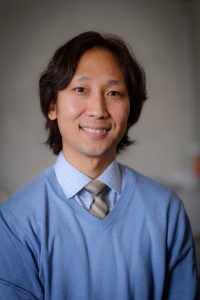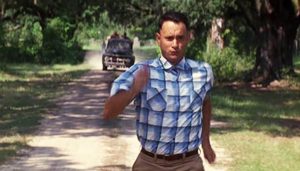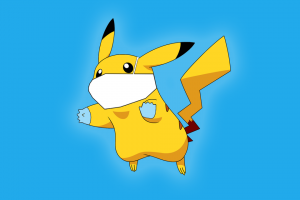Meet A Deac Monday
It’s that time again! Monday’s are for Meet A Deac. Let’s get right to it. Today I am pleased to introduce you to Dr. Samuel Cho.
 Tell me a little about you, Samuel: your title, how long you’ve been at Wake, and your educational background. I’m an Associate Professor in the Departments of Physics and Computer Science. I have a Ph.D. in Physical Chemistry and an M.S. in Chemistry, both from the University of California, San Diego. My undergraduate degrees were a B.S. in Molecular Biology and Biochemistry and B.S. in Computer Science from the University of Maryland Baltimore County. In terms of how long I have been at Wake, I try not to keep track, but I believe I’m closing in on 11 years. I prefer instead to look forward to many more.
Tell me a little about you, Samuel: your title, how long you’ve been at Wake, and your educational background. I’m an Associate Professor in the Departments of Physics and Computer Science. I have a Ph.D. in Physical Chemistry and an M.S. in Chemistry, both from the University of California, San Diego. My undergraduate degrees were a B.S. in Molecular Biology and Biochemistry and B.S. in Computer Science from the University of Maryland Baltimore County. In terms of how long I have been at Wake, I try not to keep track, but I believe I’m closing in on 11 years. I prefer instead to look forward to many more.
Well said! So what do you do at Wake, in layperson’s terms – remember, I was an English-French major :). My computational biophysics research involves using high performance computing to simulate how biomolecules such as protein and nucleic acid jiggle and fold like origami into complex shapes that allow them to function in our cells. While proteins generally allow us to live healthy lives, some of them lead to diseases such as cancer, so we want to develop drugs to inhibit them. Other times, the biomolecules misfold into incorrect shapes and lead to diseases such as Alzheimer’s, ALS, and Parkinson’s, so we also want to understand how to prevent those outcomes too.
It turns out that many of these calculations can be done at the same time in parallel, just like how each pixel in a computer image can also be rendered, so my research group repurposes graphics cards commonly used for video games to instead do these simulations. Unfortunately, the only video game I can play reasonably well is Pokemon Go, but I know how to use video game technology to perform simulations of biomolecules. This is the type of research I have done with amazing physics, computer science, chemistry, biology, math, and statistics students, and you can learn more about them at our research group webpage.
I have to say that is supercool stuff! What have you liked best about working at Wake? I really enjoy showing up to work, even virtually, just because I find myself learning new stuff or trying to do innovative things in the learning process. When I work with the students in my classes, I love it when they ask me questions to help me think about old problems in a new way. I love watching them grow and succeed.
When I work with my research students, we learn about cutting edge work and apply them to our own research problems. It’s great to meet with them about their research projects when they show up for office hours. I enjoy traveling with them to conferences and seeing them present their work. Even just when they tell me about their next steps after graduating, or they send random emails to let me know how they’re doing, it’s all pretty awesome. I even got some emails from alumni during the pandemic, and I cannot tell you how much they mean to me.
It sounds like collaboration plays a big role in your work. Absolutely. Sometimes I’ll think of a pretty crazy idea that I have not fully worked out yet, but I know it’s important. For my colleagues and the staff that I work with, their first response is usually, “let’s sit down and talk about how to make this work.” Among my many proud crazy ideas were: organizing a workshop for local area high school and middle school teachers to teach them computing (in partnership with Google), leading a team of undergraduate students to compete at a Student Cluster Competition at the world’s leading high performance computing conference (in partnership with Cisco and WFU Information Systems HPC Team), and teaching introductory physics in a brand new way that incorporates computer programming. It’s hard to imagine being in such a supportive environment somewhere else.
One of my COVID-19 crazy ideas was asking the DEAC cluster HPC Team to donate their computing resources to the Folding@Home COVID-19 research project. Many other universities and private companies, as well as individuals, joined the fight. At one point, the DEAC cluster was about the top 250 for a month, and top 500 overall. The HPC Team is awesome!
You mentioned COVID. How did it impact your work? Like all of my colleagues, my role as an instructor changed a lot during the COVID-19 pandemic. For one thing, how I administered my tests changed a lot. My students were flung across the US and even to other countries. I decided to put their approximate positions on a Google map, and you can see them here. One of my colleagues said that he had students in five different countries.
I also had to change the way that I did one of my favorite assignments, using origami to teach parallel programming in my intro computer science course. It turns out, though, that it was not challenging as I thought it would be, and here are the students with their origami hearts that they folded independently in parallel during Spring 2020. As an additional optional homework, I asked the students to mail me their origami hearts to my campus address, knowing that I probably would not check my mail on campus until the fall. Here they are. For obvious reasons, the students in my classes in Spring 2020 have a special place in my heart.
Last fall when the students came back to campus, I decided to take a class picture. Of course, with the COVID-19 restrictions, that was not something I could really do in-person, but I still really wanted to do it. So I decided to have my students create their own Bitmoji avatars for their (virtual) class pictures. I think they turned out well.
You seem to have adapted incredibly well to the changes COVID necessitated, but I know every faculty member faced great challenges. How would you describe yours? As an educator, a tough challenge is trying to create an equitable environment for learning for my students. These problems have always existed on some level before, but it has never happened to so many students at the same time. Even something as simple as writing an equation is not the same for all of the students, many who do not have a stylus. Logging into class can be challenging for students with poor internet connections or those who are logging in from other countries. I wish I could say that I have been successful dealing with these challenges, but like many others I am just trying my best and appreciate my students’ patience and resilience.
The more pressing problem is that I know for a good number of our students and also my colleagues, many of us feel isolated or miss the many activities we used to do with others. It’s much more challenging to lean on or support each other. We all have our good days and bad days. I wish I was better at identifying these problems and responding to them during the pandemic.
Speaking of students, what advice would you offer them if they asked you? The best set of advice I ever heard for students were those I read in the book Letters to a Young Scientist by the famed Harvard biologist, E. O. Wilson, who lists a good number of remarkably good advice that I cannot go through here. He also has a 15 minute TED Talk if you want an abbreviated version.
If I had to pick just one, it would be his advice, “March away from the beating of the drums. Observe from a distance but do not join the fray. Make a fray of your own.” Oftentimes I think students gravitate towards the most popular and crowded fields, and it becomes very difficult to stand out as one of the leaders when you’re constantly competing with someone else. Being able to find your own niche to distinguish yourself, one where others will appreciate your uniqueness and follow you, is far more rewarding in the long run, in my very humble opinion. Particularly if your niche is a way of helping others.
What about families? What advice would you have for them? Over the years, I have met a good number of parents and family members of my former students when they come to campus for events. I have always appreciated hearing about how their children grew up, their hopes, and their aspirations. It is clear to me that many of our students have a strong and supportive environment at home. I know that I am very fortunate to have a very supportive wife, parents, and family too, and it makes a huge difference to have a strong foundation. I suppose my advice is just to keep up the good work.
What do you miss most about normal times on campus? Attending any event where free food is involved. I’m usually very particular about the food I eat, but I have never been to an event where free food is served that was a waste of my time. Food tastes better when it’s free.
Hard to argue that logic :) Time for my favorite part: the bonus questions.
Book(s) you are reading now: I’m one of those people who like to read multiple books at a time, but an important book I am slowly working through is How to be an Antiracist by Ibram X. Kendi. I have been a long-time advocate for diversity, equity, and inclusion (DEI) issues, and I have been a member of the Biophysical Society Committee for Inclusion and Diversity since 2015. However, like a lot of people last summer, I felt that I could do better with regard to DEI issues. It turns out that I have a lot to learn. I’m working on it, and there’s a lot of work to be done.
 Favorite TV show/movie/Netflix, etc.: My favorite movie of all time is Forrest Gump. I have watched it well over 50 times now (I stopped counting at about 50). I’m not sure why, but I always feel like I learn something new every time I watch it. That’s all I have to say about that.
Favorite TV show/movie/Netflix, etc.: My favorite movie of all time is Forrest Gump. I have watched it well over 50 times now (I stopped counting at about 50). I’m not sure why, but I always feel like I learn something new every time I watch it. That’s all I have to say about that.
My favorite movie this year is Minari, a story about a Korean-American family that picks up everything and moves to a rural part of America. It won the Golden Globes in the “Foreign Language Film” category, which is remarkable because it is a distinctively American story, and it has some parallels to my own family’s American story. I also lived most of my childhood in a rural part of America, which I always thought was pretty unique. When I first heard about the movie, I thought maybe someone out there owed my family royalties. Thanks to my cousin’s better half, Liz, and her sister, Allison, I was able to see an advanced screening. It turns out that the movie was not all that similar to my own life, so I’m not expecting a fat check anytime soon. While I enjoyed the movie a lot, my mother said, “Don’t you think our family story is way more interesting and exciting?” As usual, she’s right. So if someone wants to make a sequel or a remake, I’m sure my mother has a lot to say.
Websites you frequent: I use Google a lot. I know this sounds silly, but I know that most people who work with technology actively use Google in their profession. If someone were to track my internet usage, I’m pretty sure Google would be the top website I visit.
 Guilty pleasure: I like looking at pictures of cats and dogs. Yes, really. My favorite website is a subReddit of cute and cuddly pictures.
Guilty pleasure: I like looking at pictures of cats and dogs. Yes, really. My favorite website is a subReddit of cute and cuddly pictures.
Introvert or extrovert? I am definitely an introvert that is actively pretending to be an extrovert. I know social anxiety does not always happen with introverts, but it happens for me. In fact, I used to be painfully shy growing up, and public speaking is still not my favorite thing, which sounds pretty strange considering my profession. If you’re one of those people who don’t want to raise your hand, go up to the board, or be the center of attention, I get you. But I also know that you have to put yourself out there to be noticed.
Also, just know that it may never go away completely, but it gets a lot easier over time and can be an enormous source of strength. When you’re afraid, you’re usually afraid of just that one thing at a time, which means that a lot of other distractions get blocked out. So, in that moment, you can focus on just that one thing. It can be awesome to be an introvert and to have (manageable) social anxiety.
 Something most people don’t know about you? I am one of the faculty and staff advisors for the Pokemon Go student organization on campus. Last time I checked, there are about 75 members. In between classes, we do an occasional raid together. During pandemic times, many of us are participating through remote raids. Since 2018, according to the app, I have walked over 5,000 km, mostly on Wake’s campus. It turns out that I walk a lot going from class to class and meeting to meeting. If your Deac plays Pokemon Go and wants to join us, have them send me an email. I will put your student in touch with the student president of the organization.
Something most people don’t know about you? I am one of the faculty and staff advisors for the Pokemon Go student organization on campus. Last time I checked, there are about 75 members. In between classes, we do an occasional raid together. During pandemic times, many of us are participating through remote raids. Since 2018, according to the app, I have walked over 5,000 km, mostly on Wake’s campus. It turns out that I walk a lot going from class to class and meeting to meeting. If your Deac plays Pokemon Go and wants to join us, have them send me an email. I will put your student in touch with the student president of the organization.
What’s the first thing you’ll do when the pandemic is over and we can live normal lives again? I’m looking forward to hugging my parents again. It has been a long time.
So what didn’t I ask that you wish I had? “What is something else most people don’t know about you?” When I am teaching class or attending a meeting remotely, my 5 lb Yorkie, Chloe, is quietly sitting on my lap. Very infrequently, she makes an appearance (sometimes wearing a Wake Forest outfit), but Chloe has been very good throughout the pandemic. She has patiently sat through many undergraduate and graduate level Physics and Computer Science lectures. On weekends, she barks at me to go to my office around the time of day when I usually teach. At this point I wonder if Chloe qualifies for some type of honorary Wake Forest University degree or if she should be hired as a supervisor or some sort. Here is Chloe.
Samuel, this has been so great. Thank you for sharing your story with us – and for all the ways you help our students, our campus, and how you are adding to important scientific knowledge!
(And if you want to see past Meet A Deacs, visit our archive.)
